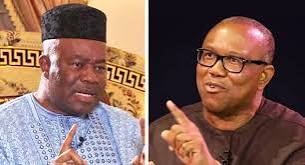Sam Amadi, Director of the Abuja School of Social and Political Thoughts, has strongly criticized what he described as a “growing pattern” of targeted verbal attacks on Peter Obi, the 2023 Labour Party presidential candidate, by senior members of the current administration.
In a commentary posted via his official X account, Amadi decried what he called the political elite’s fixation on Obi, despite the former Anambra State governor’s consistent focus on Nigeria’s deepening economic and social crises rather than on personalities or partisan rivalries.
He referenced recent verbal rebukes from Senate President Godswill Akpabio, the Governor of Lagos State, and spokespersons from the Presidency, following Obi’s remarks in which he said, “the labour of our heroes past has gone in vain.”
The statement, widely interpreted as a somber commentary on Nigeria’s declining governance and socio-economic standards, drew sharp responses from Akpabio and others, who accused Obi of dishonouring national icons.
Dr. Amadi, however, argued that such backlash reveals a misplaced priority among Nigeria’s ruling class.
“While Peter Obi continues to engage on issues—economic reform, prudent governance, and national development—the government appears more concerned with rebutting his critiques than addressing the underlying problems,” Amadi stated.
He went further to describe Obi as the only recent candidate whose campaign and post-election engagements have remained anchored on measurable reforms, fiscal responsibility, and social equity. “If elections were a purely rational exercise,” Amadi noted, “Peter Obi is so far the only candidate who ought to be elected.”
The public intellectual also criticized the administration’s response to opposition viewpoints, suggesting that government figures are becoming increasingly defensive in the face of legitimate national critique.
Amadi’s remarks have sparked widespread engagement across social media platforms, with many Nigerians resonating with his call for a shift from personal attacks to policy dialogue. Commentators have emphasized the need for the government to embrace critical voices as part of a healthy democratic process.
The episode underscores a broader tension within Nigeria’s political landscape, as citizens demand more responsiveness and issue-based governance while opposition leaders face escalating pushback for their critiques of the status quo.















